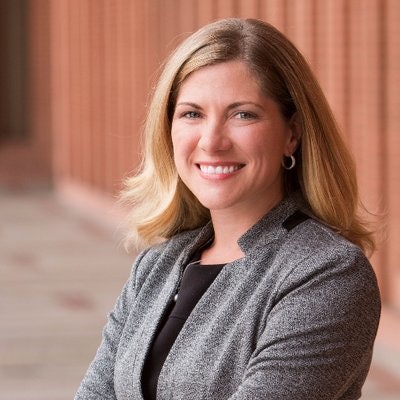Earlier this fall, leaders in two scientific professions made bold and urgent statements about the need for systemic change in their fields. The American Psychological Association adopted a resolution apologizing for its role in systemic racism, recognizing that it had been “complicit in contributing to systemic inequities” and committing to ”immediate actions of remedy and repair, in addition to long-term actions.”
The Astro2020 Decadal Survey--a systematic assessment of priorities for the next decade--was also released last month. For the first time, astronomy assessed not only the field’s intellectual progress but also the state of the profession. It offered a comprehensive and integrated set of actions for overcoming “a systemic failure of the Profession to attract, retain, and advance diverse talent.”  Dr. Julie Posselt
Dr. Julie Posselt
From our vantage points as a leading scholar of equity in science and as the Alfred P. Sloan Foundation’s program director for diversity, equity, and inclusion (DEI) in STEM higher education, these ambitious visions for systemic change are promising. Without systemic change, efforts to remedy racism, sexism, and other forms of discrimination in the STEM fields will continue to occur at the margins, reinforcing the status quo. This is particularly true in STEM graduate education, where the next generation of scientists is socialized to norms, practices, and networks of knowledge production.
For the last year, we have been exploring the landscapes of research and funding for DEI in STEM graduate education. Alongside a funding review carried out by Higher Ed Insight, a team from USC’s Pullias Center for Higher Education--under one of the author’s direction--carried out a systematic review of recent research on what facilitates access to and success in STEM graduate education for racially minoritized students, considering intersections with gender and other identities.
What does the research say?
The research review revealed that scholars have published much more on the causes and consequences of inequalities than on efforts to reduce them. Among such efforts, we saw three broad patterns in “what works.” First, some interventions that serve individuals have been effective in facilitating the transition from undergraduate to graduate education for select students. Second, structures of support (e.g., funding, mentoring) are critical, as they smooth the often precarious pathways into and through graduate education. A third pattern indicated the value of institutional change efforts that reorient organizational policy and standard practice. Such efforts are promising for overcoming institutionalized racism and for culture change. Yet, alone they are insufficient for such change to occur.
What is missing?
Largely missing from both funding and research have been efforts to improve the system of STEM higher education. The research review shows that research on STEM graduate education has examined specific elements of this system rather than how well they function together.
Systems are elements of interconnected interactions and feedbacks, which function collectively to achieve a goal. The system of graduate education consists of people, practices, resources, and organizations. It achieves training for the labor market and the production of new knowledge. However, because of how this system was originally conceived and has developed over time, it is also “achieving” a very real outcome of racialized exclusion. Inequities created and reinforced by the system of graduate education directly contribute to systemic inequities in the disciplines and professions. Dr. Lorelle Espinosa
Dr. Lorelle Espinosa
What does it mean to support systemic change?
To shift from investments that change the odds for individuals to investments that help align the system with diversity, equity, and inclusion requires a systems change approach. Results of the research and funding reviews have therefore led the Sloan Foundation’s STEM higher education program to pursue systemic change as one of six strategic priorities. We offer here four examples of what this looks like in practice, from current thinking about complex systems:
- Systemic change means improving connections.
In well-functioning systems, connections between key elements are strong and clear. Biases and barriers disrupt those connections. As a gatekeeper to graduate education, the GRE has rightfully been a focus in admissions redesign for its role in reproducing racial inequalities. Even before widespread elimination of test score requirements due to the COVID-19 pandemic, many had begun shifting away from their use and toward a holistic review. The American Astronomical Society issued a resolution on the GRE in 2016, and the recent calls to action in both astronomy and psychology recommended elimination of test score requirements for admissions.
System change also demands strengthening connections between the baccalaureate origins of many Black, Indigenous, and Latinx undergraduate students and the predominantly white research universities where most PhDs are awarded. Despite the fact that Minority Serving Institutions (MSIs) confer one-fifth of the nation’s bachelor’s degrees and have a tradition of sending their students to STEM graduate programs, faculty involved in PhD admissions often fail to recognize the value of MSIs when assessing college “pedigree.” In training a large share of bachelor’s degree recipients in STEM who identify as Black, Latinx, and Indigenous, MSIs hold the keys to what means to truly serve racially minoritized students.
The Sloan Foundation recently launched an Equitable Pathways to STEM Graduate Education portfolio, which by the end of the year will award 20 grants that build and strengthen pathways from MSIs to graduate programs at partnering universities. It should come as no surprise that most of these new partnerships include, among other activities, graduate admissions redesign that incorporates holistic review. Equity-minded holistic review and MSI pathways are intrinsically linked: by changing evaluation processes in academia to value different and additional qualities in applicants, we can reduce barriers and more closely align excellence with diversity.
2. System change means creating levers that affect large portions of the system.
The Accelerating Systemic Change Network says that system change “occurs when change reaches all or most parts of a system, thus affecting the behavior of the entire system.” When more equitable practices for evaluating and training graduate students spread and become the standard at a field-level, system change is occurring. But, one might ask, how can anything become “standard” in a system as decentralized as graduate education?
Organizational and social psychological theory offers guidance and has helped inspire a successful research-practice partnership directed by one of the authors of this essay, Posselt. The California Consortium for Inclusive Doctoral Education (C-CIDE) develops infrastructure for faculty development and institutional change--specifically in universities whose changes are likely to motivate other universities in the system to begin changing, too.
The NSF-funded pilot invested in 24 PhD programs in six universities: University of California- Berkeley, Davis, Irvine, San Diego, and Santa Barbara, and University of Southern California. An external evaluation found that PhD program partners were significantly more likely to use inclusive recruitment and admissions practices and had significantly higher numbers and fractions of racially minoritized applicants, admittees, and enrolled students. Now, with a planning grant from the Sloan Foundation, a second and influential group of selective, private universities in the Northeast are onboarding. When leaders in a system make change, many others will follow.
3. Systemic change means managing complexity.
Social systems are inherently complex, and inequalities are wicked problems that require managing complexity. That management involves thinking about individual actions, organizational practices, incentive structures, and public policies. It takes flexible, lateral thinking to work across these levels, and across domains of practice like recruitment, admissions, and mentoring that are typically addressed in isolation. It also means working across lines of social identity, power, and privilege. No single effort will be able to touch all of these issues simultaneously. And this is ok--complex systems theory tells us that to think systemically is more than thinking bigger, it’s thinking smarter, more strategically.
One campus, the University of California-San Diego, exemplifies progress in multiple domains of practice as a member of both C-CIDE (which has been focused on admissions) and the Sloan University Center for Exemplary Mentoring (UCEM). They have a highly effective graduate division whose approach to leadership includes advocacy on key issues and meaningful dialogue with PhD programs and their leaders. Through UCEM & C-CIDE, UCSD has seen how working to simultaneously improve graduate mentoring and admissions indeed involves managing complexity—but that it also elicits a broader, integrated conversation. The same mindsets about excellence and diversity that affect how prospective students are admitted also affect how faculty teach and mentor students who enroll.
4. Finally, system change means revisiting outcomes.
Systems are directed toward outcomes, and the pursuit of new knowledge has always inspired graduate education and the disciplines. The Astronomy 2020 decadal survey report acknowledges, “The pursuit of science, and scientific excellence, is inseparable from the humans who animate it.” Excellence in science has long been hampered by inequities in how humans gain access to, experience, and advance within the scientific enterprise. Centering humans in the pursuit of knowledge is therefore an overdue cultural shift.
In closing, as individuals, universities, foundations, and whole disciplines commit to confronting racism and inequity as systemic, we are going to need new knowledge, new tools, and new skills to carry out new partnerships. The science of complex systems offers insights to all who are serious about collaborating today toward a more just future.
Dr. Julie Posselt is an associate professor of higher education in the USC Rossier School of Education.
Dr. Lorelle L. Espinosa serves as program director at the Alfred P. Sloan Foundation.















